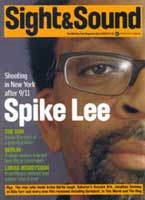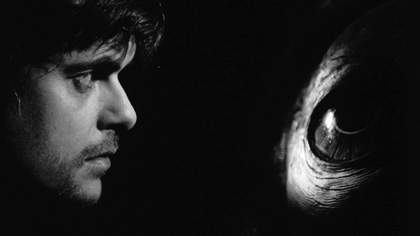
Outside the Whale
Film of the Month: Werckmeister Harmonies

Béla Tarr's Werckmeister Harmonies charts the nightmare disintegration of a small-town community. Was a whale to blame, asks Jonathan Romney
Until recently Hungarian director Béla Tarr enjoyed something of a mythical status on the international scene. Relatively few people had seen his seven-and-a-quarter hour drama Satantango (1994), and if his name was bandied around it was largely because of its inclusion in a controversial essay by Susan Sontag which heralded him as a standard-bearer for an unapologetically serious-minded film culture.
Even now that his films have been more widely seen, Tarr's reputation remains quasi-legendary. This is partly because he represents a hardline belief in a cinema of patience and severity, of tableaux and long takes, in some ways echoing that of his countryman Miklós Jancsó. Partly too it is because of his films' revelatory effect on viewers: Gus Van Sant, for instance, seems to have experienced a Damascene conversion on discovering Tarr, resulting in his recent quixotically minimalist Gerry.
Tarr's films since 1987, in collaboration with screenwriter/novelist László Krasznahorkai, may be challenging in their often extreme use of duration, but they are hardly short on narrative drive or solemn romanticism. Werckmeister Harmonies based on Krasznahorkai's novel The Melancholy of Resistance is Tarr's first truly gothic film, introducing an element of the fantastic, even the supernatural. Yet there is no spectacular illusionism involved the fabulous whale from a visiting circus is a prop as transparently theatrical as the rhino in Fellini's And the Ship Sails On, and all we see of the apparently satanic Prince is a dwarfish shadow on a wall.
As a metaphysical horror story, Werckmeister Harmonies deserves to be Tarr's breakthrough with a cult audience, especially since its atmosphere bears comparison with early David Lynch. The hermetic world Tarr creates is ineffably mysterious, yet the film's representation is rooted in a scrupulously mundane naturalism (Tarr started out making dramas of working life beside which the Dardennes' films look wilfully baroque).
Werckmeister Harmonies is a collaborative film par excellence: the opening titles credit it jointly to Tarr, Krasznahorkai and editor Agnes Hranitzky, Tarr's wife and long-time collaborator. The strength of their collective vision is proved by a remarkable unity of tone and look, despite an extended production period that involved seven cinematographers (including Rob Tregenza, a specialist in slow-take cinema in his own right). Throughout, the film maintains its harsh chiaroscuro and a style of camera movement that creates a forever shifting space: closed to the outside world, the small town where the action takes place contains endlessly explorable interiors, such as the cavernous, Wellesian expanses of Eszter's house, unfolded by a roaming camera.
The haunted, bony features of German actor Lars Rudolph, who plays lead protagonist Valuska, may suggest a Dostoievskian holy fool, but the tone of Krasznahorkai's novel radically stripped down in his and Tarr's screenplay, its verbal torrents reduced to a chill autism is closer, as W.G. Sebald has suggested, to Gogol. The universe of Werckmeister Harmonies is ruled by the Gogolian quality of poshlosht, best described as a transcendental crassness and incarnated here by the fearsome Tünde, played by Hanna Schygulla (dubbed, like Rudolph, into Hungarian). Initially it comes as a shock to see Fassbinder's perennial vamp as an elderly, well-padded babushka, though that may be Tünde's deceptive guise, for the next time we see her, dancing with her drunken lover, she seems to have regained a calculating sexual force.
The film is dominated by a brooding atmosphere of apocalyptic unrest, though it is implied that the cosmic 'evil' pervading the town is the product of bourgeois paranoia. Tempting as it may be to relate the story to political changes in Hungary in the last days of Communism (Krasznahorkai's novel was published in 1989), Tarr has insisted that his films contain no allegory. Yet the narrative is certainly one of anxiety about the breakdown of an old, enfeebled order and the explosive release of repressed popular energies. Little in recent cinema is as terrifying as the sequence in which the masses attack a dilapidated hospital, beating up patients as they go: the violence, in an eight-minute shot, is accentuated by the ghostly placidity of the camera's drift along passageways and round corners, like a distracted onlooker. At last the hordes stop dead at the sight of a skeletal, naked old man the decrepit earthly remnant of God, perhaps? and lumber out like George Romero zombies while Tarr holds a close-up of Valuska's stare.
Yet it is impossible to determine the ultimate cause of the chaos. From the very start rumours are rife about the universal disruption heralded by the anticipated eclipse. But is any of it really caused by the arrival of the whale, or is the huge dead creature, with its glassy eye, simply the impotent witness to human destructiveness? Is the supposedly demonic demagogue Prince anything more than an impotent, robotic-voiced homunculus? The one truly identifiable centre of malevolence is Tünde, a reactionary opportunist exploiting superstition to gain power in the name of order. It may even be that her musicologist ex-husband Eszter, obsessed with the theories of 17th-century German composer Werckmeister, has himself contributed to disturbing the harmonic order of things by withdrawing from any active involvement; at the very least he is a representative of an enfeebled intelligentsia, vainly fiddling with abstractions while the world burns.
The other great enigma is Valuska's role in events. Seemingly an innocent treated with gentle indulgence, he has an implicit megalomania: directing a bar of drunks in a re-enactment of cosmic motion in the opening scene, he plays not only a beer-parlour deity but also a film-director figure within the fiction. He is characterised above all as a seer, gazing at the world, whether staring into the inscrutable eye of the whale or as a mute witness to violence. But his part in the terrible night remains unclear: when he reads a diary account of events we never quite know whether he's reading a narrative of his own involvement or whether he has 'authored' the events in a more oblique way whether he has somehow, if only by passive collusion with Tünde, catalysed the apocalypse.
In the end the defeated thinker Eszter finally visits the whale, now beached and exposed in the wrecked square and more inscrutable than ever. It's hard to imagine a more downbeat ending the complete triumph of entropy and reaction yet this conclusion derives a profound grace from the extremity of its pessimism. Explaining the cosmos to his drunks, Valuska pleads, "All I ask is that you step with me into the bottomlessness", and that is essentially Tarr's invitation to the viewer. The enigmatic harmonic preoccupations alluded to in the title suggest that this film rich in movement, low on dialogue aspires, as the old phrase has it, to the condition of music. But Tarr's true achievement is to attain the condition of silence, and of bottomless, awesomely inscrutable nightmare.
